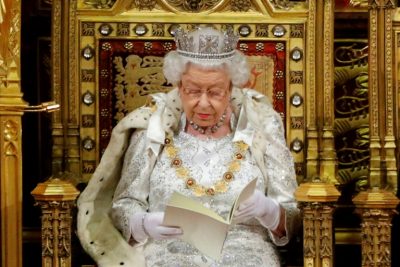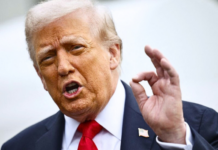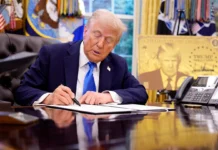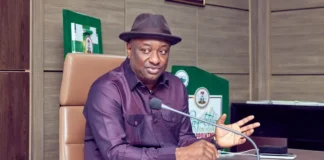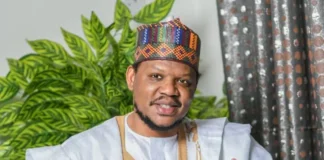Prime Minister Boris Johnson repeated Monday that Britain must leave the EU on October 31, as divorce talks resumed in Brussels in a pivotal week that could define how and when Brexit finally happens.
In an elaborate ceremony in parliament in London, Queen Elizabeth II set out Johnson’s legislative programme for the coming year, with leaving the EU top of the agenda.
“My government’s priority has always been to secure the United Kingdom’s departure from the European Union on October 31,” she said in a speech to robed peers from a gilded throne in the upper House of Lords.
Read Also British PM Johnson the Brexit ‘Hulk’ finally meets EU’s Juncker
“My government intends to work towards a new partnership with the European Union, based on free trade and friendly cooperation.”
But this depends on the outcome of closed-door discussions in Brussels, where officials are racing to reach a deal on Britain’s exit terms before a summit of EU leaders starting on Thursday.
If he cannot get a deal by Saturday, Johnson will fall foul of a British law demanding he ask the EU to delay Brexit for a third time rather than risk a potentially disastrous “no deal” departure.
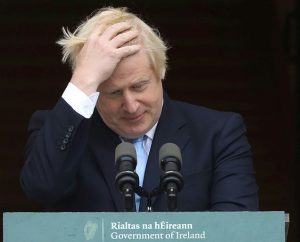
“A deal is possible and it’s possible this month,” Irish Deputy Prime Minister Simon Coveney said as he arrived for talks with EU foreign ministers in Luxembourg.
“It may even be possible this week but we’re not there yet.”
Michel Barnier, the bloc’s chief Brexit negotiator, briefed EU ambassadors late Sunday after a weekend of talks between officials described as “intense” and “constructive”.
After weeks of gloom, the last few days have given a glimmer of hope that an agreement can be reached but there has so far been no decisive breakthrough.
Barnier warned on Sunday that “a lot of work remains to be done”.
This message echoed by Johnson’s spokesman in London, who said on Monday: “The talks are constructive but there is a lot of work still to do.”

More than three years after the 2016 referendum vote to leave the EU, divorce talks remain stuck on how to avoid customs checks between British Northern Ireland and Ireland.
After British MPs rejected a previous plan, Johnson put forward fresh proposals earlier this month — but they have been met with a cool response in Brussels.
– ‘Release the chutzpah’ –
Johnson took over from his predecessor Theresa May in July vowing no more delays, after she postponed Brexit twice in a failed attempt to get her own divorce deal through the British parliament.
But he has no majority in the House of Commons, leaving him powerless even to call an election without the support of opposition parties.
In a statement issued alongside Queen Elizabeth II’s speech, Johnson said the British public were “tired of stasis, gridlock and waiting for change”.
It was time to leave the EU and seize new opportunities, “to tear away that bureaucratic red tape, to set our own rules, and to release the talent, creativity, innovation and chutzpah that exists in every corner of our United Kingdom”.
As well as a commitment to Brexit, the Queen’s Speech included a raft of domestic measures, from tackling domestic violence to plastic pollution.
– ‘The clock is ticking’ –
Earlier, finance minister Sajid Javid announced the government’s first post-Brexit budget would take place on November 6 “to shape the economy for the future”.
But Johnson is unlikely to get any of his plans through the Commons, and if an election comes, a new Queen’s Speech will be necessary.
“I’m not sure they’ll still be in office on November 6 and it doesn’t appear to be at all certain that we will leave the EU on October 31,” said Scottish National Party leader Nicola Sturgeon.
Some resolution is expected when the British parliament holds its first Saturday sitting since the 1982 Falklands War.
A law passed against Johnson’s wishes last month requires him to ask the EU to delay Brexit by three months if MPs have not approved a Brexit deal or a “no deal” departure by October 19.
Johnson could theoretically refuse, although he would face an immediate court challenge.
EU leaders could complicate matters further still by deciding to offer Britain extension terms that parliament cannot accept.
But Brussels insists the ball is now in Johnson’s court.
“If the British government wants a solution, it must move quickly now,” a European diplomat told AFP. “The clock is ticking,”
AFP

